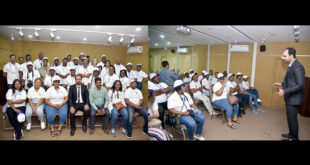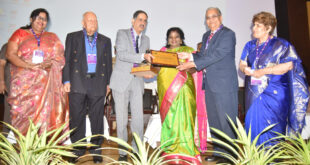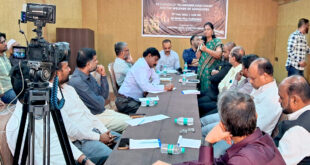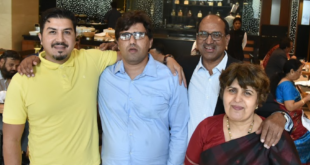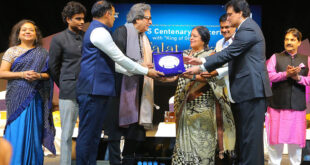Did you know paintings have life? And that they can speak, and scream albeit silently or shout out loud? Sometimes they can be brawny, sometimes brainy, and at times powerful enough to conjure a virtual storm. Add a splash of humour and they can coax us into belly laugh or a stroke of intellect on canvas can push us to the abyss of deep thinking. Sometimes, if can just be an unwinding dreamscape.
From Leonardo da Vinci’s famous Monalisa portrait to Picasso’s Guernica intriguingly depicting bombings of Spanish Civil war to Salvador Dali’s “Persistence of Memory” showcasing the recalcitrancy of time, paintings are the artist’s expression of a preconceived subject. For internationally renowned Hyderabadi artist Fawad Tamkanath, a painting is more than just fine art. It’s a way of life.


Born into the family of an Urdu luminary and famous departed poet Shaaz Tamkanath, Fawad Tamkanath is every bit an artist with a quest to look at the oft-neglected and time-valued things that are fading into oblivion. From a busy cityscape to a modern outlook to faces that tell a thousand stories, the paintings adorning his private gallery are exemplary of artful tale-telling to make a difference, as the brush strokes from one edge of the canvas through other.
He paints a language of work that’s deeply intriguing for anyone who has cared to present a captivating side of plebeian life. For instance, the depictions of typical Hyderabadi culture whether of the locals sipping Irani Chai on a ‘Summer Afternoon’ at a local Hyderabadi café or an aged proletarian squeezing his strength to pedal his rickshaw as he ferries a family amidst cacophonous streets.
Fawad, who is now among the top artists in India, admits that women fascinated him during his teaching stint at a women’s college early in his career. He says “the whole world is in the palms of a woman, and they are the ones who make our society”.
On having diversified his work to include contemporary and modern art, Fawad says “an artists’ painting subject may change from time to time, as the artists grows, and will gradually depicts his personality in his work of art.”
While artists who get the opportunity of recognition make it big, others with great talent find themselves confined to street side takers. Commenting on this, Fawad says “there is great talent in India for art. But people must be educated as the perception of an artist is greatly influenced by the stroke of knowledge acquired through education. An artist might be innately talented but education can mould his career towards success.”
There should be schools for teaching and appreciating art in India. We should have painting and drawing appreciation courses, he adds.
The difference between an Indian artist and an artist from the west is primarily the “choice of colour a painter uses. Such choice is innately influenced by the country or region one lives in. For instance, artists in the west may use cool or subtle colours like blue or grays while Indian artists may depict the same art in warm colours because there is more sunshine in India than many parts of the west, and that influences your painting patterns.
While paintings may have originated in the prehistoric era and now become anecdotes of Indian history, they are still relevant today. In fact, despite the advancement of digital art by use of computers and modern technology, traditional paintings focusing on abstract, conceptual and illustrative works, will continue to find protagonists, even decades forward in the future, he maintains.
Talk about what good technology has to offer an artist like him, he says “it is versatility. But like all good work, art is vulnerable to illegal and unauthorized replication. Technology must be used positively, and there should be better infrastructure for securing one’s art.”
For Fawad Tamkanath, ‘art is a way of life’. In a breakaway from traditional proposition, he advises against setting goals as ‘setting goals makes one rigid, and narrows the window of creativity’.
Fawad is a gold medalist in Art by academics, and professional painter with 27 solo shows, many of which were held outside India. His work has found great admirers and was previewed at some of the most famous art exhibitions in the world including the Miami Art Fair. Fawad Tamkanath’s Paintings have found affluent takers both inside and outside India – from hotels and corporates to celebrities and art lovers. His work is due for a Solo Show in Italy’s capital city Florence in October 2017.
The artist was speaking exclusively to Syed Khaled Shahbaaz for an interview with Gawah Urdu Weekly. The interview was also published in in the print and digital editions of The Hans India English Daily on 20th December 2016. It was also published in the print edition of Gawah Urdu Weekly.
Liked the feature? Follow us on Facebook and Google Plus to stay updated.
 Gawah (The Witness) – Latest News, Current Affairs, Politics, Sports, Religion, Literature, Technology, Education, National, Local – Hyderabad Telangana India World Fearless By Birth, Pristine by Choice – First National Urdu Weekly From South India – Latest News, Breaking News, Special Stories, Interviews, Islamic, World, India, National News
Gawah (The Witness) – Latest News, Current Affairs, Politics, Sports, Religion, Literature, Technology, Education, National, Local – Hyderabad Telangana India World Fearless By Birth, Pristine by Choice – First National Urdu Weekly From South India – Latest News, Breaking News, Special Stories, Interviews, Islamic, World, India, National News

